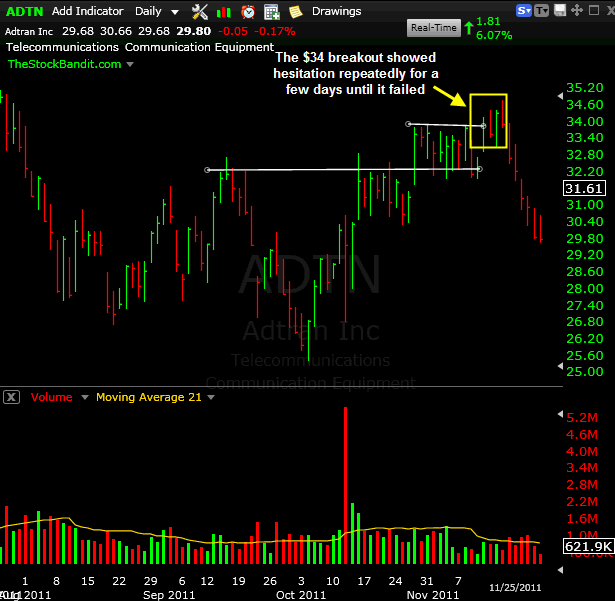Viewing a Loss as a Courtesy
My ‘Don’t Be a Monkey‘ post prompted some discussion on how to view losses, so I just want to explore that idea a little further. Specifically, Eric commented ‘learn to love loss, and you are on your way.’
Love might not be my chosen word for it, but yeah, that’s the idea. Put it this way…
Last year, we were house hunting with our realtor. When we’d pull up in front of a house that just wasn’t at all our style, we’d offer a preventive “next” to save us all the time of going through a house we just didn’t envision actually buying.
You can’t judge a book by its cover, but some houses you can! Plus, this was a close friend, so he didn’t mind. In fact, he appreciated it. By crossing those no-way houses off our list, it narrowed the search and saved him time.
Couldn’t you view your trades that same way? You could even look at each position as an employee. Poor performance is grounds for dismissal. Take the attitude of “thanks for letting me know you aren’t going to work so I can move on to the next candidate.”
When your trade’s showing you poor price action, don’t get upset. That just might be a gift – a signal to move on to the next idea. No point in getting your feathers ruffled or making it personal. That will only compound your frustration.
In our member area, I’ve been trading the exact same way. Booking some winners here and losses there, playing the numbers game that trading always is. No single trade carries great importance, but it’s important that losses are viewed properly. A failed breakout or a sluggish move away from a key area means the trade is suspect and may require an adjustment or early exit. I appreciate those warnings from the price action.
And even when in a position, I’m taking note of those subtle changes of character, staying aware of signals the price action may be sending which suggest the trade is struggling.
Recently I entered ADTN upon a breakout attempt at $34, but it just couldn’t stick. A few attempts to clear that level continued to show hesitation, so I tightened my initial stop by 2% on 11/16. I’m glad I did. The stock reversed to stop me out the next day, I booked a tiny 1.7% loss, and moved on to the next trade.

By taking cues from the price action (including failed patterns), it’ll only save you money by way of useful adjustments. Look at those as a courtesy.
Trade Like A Bandit!
Jeff White
Producer of The Bandit Broadcast
To see what I’m trading tomorrow and how I manage my trades, check out the free trial of our stock pick service.







Eric | Nov 29, 2011 | Reply
‘Love’ MIGHT be too strong of a word, it all depends on how you look at it.
If you think of it this way:
That loss allowed me to not lose any more than necessary to prove that I was wrong
That loss allowed me to move on to my next winner and waste no more valuable time or capital on a loser
That small loss is just a cost of doing business and part of profitable trading
I LOVE profitable trading and taking small losses is what allows us to be profitable. So in a round-a-bout way, we could learn to love our losses. But, if you ever find a way to get a win ratio of 100% with no drawdown, I have a feeling you’d be an even more popular guy ; )
Keep the great articles comin’.
Eric
Anonymous | Nov 29, 2011 | Reply
Thanks Eric, I fully agree. Just wanted to build on your comment from that previous post because it got my wheels turning. You bring forth some excellent points here and you’re absolutely right. Thanks again for sharing your views here!
Mark | Nov 30, 2011 | Reply
On the subject of loving: One can, and probably does, love ones stocks also. In many ways. There’s the dependant love: “the stocks will look after me and make everything OK and provide (financial) nurturing”. There’s the nurturing love: “maybe if I look after them and love them they will flourish and do well”. There’s the fostering a new relationship: like lovingly petting a strange dog and then being bitten on the hand etc. etc. Stocks can even be sexy (Freud speaking there).
I like the notion of loving one’s losses. If one can adapt to love such thinks like taking the garbage out, mowing the lawn, then contentment follows, and with that comes success. Perhaps traders need regular counselling to explore their emotions around trading and function better. People go to the gym to build up their muscles. Counselling builds mental strength, power and competence. Just a thought.
I like the way Jeff includes human aspects (self and others), and I think that’s probably the key to success in trading, and in life.
Anonymous | Nov 30, 2011 | Reply
Thanks for sharing your thoughts Mark, I particularly liked the “if one can adapt to love such things like taking the garbage out, mowing the lawn, then contentment follows, and with that comes success.” Very good point on embracing losses so that they are kept small, and therefore don’t become too costly.